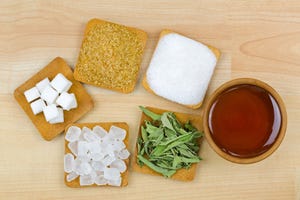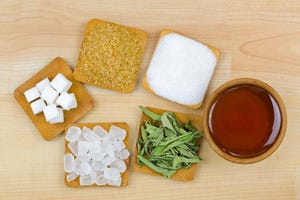
6 Best Natural Sugar Alternatives - CNET
In the age of processed foods, the American diet has changed rapidly. Sugar intake — particularly added, refined sugars that aren’t naturally part of the foods you consume — has increased dramatically, leaving many of us feeling addicted to sweetness.
According to the Centers for Disease Control and Prevention, the average adult consumes 17 teaspoons of added sugars daily, far above recommended levels. An ideal diet consists of no more than 10% calories from added sugar, which would be 12 teaspoons in an average 2,000-calorie intake.
Many people already agree with what the data confirms: we eat too much sugar. If that’s you and you’re looking for ways to cut added sugar out of your diet, read on to learn some of the best sugar alternatives.
What are sugar substitutes?
Before we get into sugar alternatives, it’s important to clarify that sugar isn’t inherently bad for you. In fact, it’s vital for your health. Your body turns carbohydrates into glucose, a form of sugar, and this is a primary source of energy to keep your body moving and your brain functioning. Despite what some popular diet fads advocate, without carbs and sugars, you may experience health problems and symptoms such as low energy, sleep problems and brain fog.
The goal shouldn’t be to avoid sugar but to consume the right kinds of sugar. Much of today’s American diet consists of added sugars, which are processed and refined to add intense sweetness without much substance. Ultra-refined white sugar and high-fructose corn syrup are common ingredients in sodas, pastries, bread and condiments. These get delivered quickly to your bloodstream without adding other nutritional value along the way. Excessive consumption of these sugars can lead to serious health complications, including high blood pressure, diabetes and fatty liver disease.
You can find the amount of added sugars on the nutrition facts label and ingredients list of any food item. The higher up added sugar is on the ingredients list, the more sugar is in the product. Added sugars go by a lot of different names, such as brown sugar, corn sweeteners, corn syrup, dextrose, fructose, glucose, high-fructose corn syrup, malt syrup, maltose and sucrose.
In contrast, natural sugars are unrefined or only lightly processed and found naturally in many foods. Fruits contain fructose, for example, but they’re also high in fiber, providing a balanced combination of nutrients for your body. Honey and maple syrup are naturally sweet but also rich in minerals, vitamins and antioxidants.
There are also various natural sweeteners and sugar substitutes that you can add to food and beverages that provide sweetness without the downsides of refined sugars. Examples of these alternative sugars include sugar alcohols like sorbitol, artificial sweeteners like aspartame and natural sweeteners like stevia.
Best natural alternatives to sugar

Here’s the good news: If you want to cut back on sugar, you still have plenty of options for keeping things sweet. Below are six of the best natural sugar alternatives you can add to your diet in place of refined sugars.
Honey
Honey has long been appreciated not only for its natural sweetness but also for its nutritional value. Because it’s made by bees from plant nectar in the process of pollination, honey contains an array of beneficial plant compounds and antioxidants.
Raw and darker honey, which are minimally processed, are rich in flavonoids and phenolic acids, in particular. These offer many benefits, including positive effects on cardiovascular, gastrointestinal and respiratory health. It’s even been shown to reduce seasonal allergies.
Maple syrup
Another popular natural sweetener, maple syrup, has claimed its place atop many pancakes. If you’re cutting back on sugar, you may want to skip the pancakes but hang on to the syrup, which is produced from the sap of sugar maple trees.
That’s because maple syrup, like honey, contains antioxidants and minerals that can be beneficial for your health. Many of the unique compounds found in maple syrup have, in fact, been shown to help combat cancer and diabetes. The darker the maple syrup, the less refined it is — and the more of these benefits it may provide.
Stevia
If you’re not a fan of the flavor of maple syrup or honey but still want a way to sweeten up beverages and recipes, stevia is a great natural sugar alternative to try. This sweetener is made from the Stevia plant, and it’s 200 to 400 times sweeter than table sugar.
As a sugar substitute, stevia is non-nutritive, meaning it contains almost no calories. It adds sweetness without much else, and that may be just what you’re looking for when cutting back on sugar. Stevia has also been correlated with reduced blood sugar and cholesterol. Keep in mind that many stevia products on the market contain other processed ingredients or sugar alcohols, so it’s important to do your research before using them.
Pureed fruits
If you’re looking for a more nutritionally balanced form of sugar, it’s tough to beat raw fruits. The dietary fiber present in raw fruits aids in digestion and slows down sugar metabolism, reducing blood sugar spikes you might see from fruit juice or sugar additives. Eating fiber-rich foods can also help you reduce your total caloric intake and lower your risk of heart disease.
Pureed fruits give you many of the same benefits, and they can serve as sweeteners to add to other foods. Applesauce works as an egg substitute in many recipes, for instance, and pureed berries make a great addition to plain, unsweetened yogurt.
Monk fruit
Monk fruit is another plant-based alternative sugar. This one is extracted from monk fruit, also known as luo han guo, a small round fruit that’s commonly found in Southeast Asia. Although monk fruit itself contains fructose and glucose, these are actually removed in the extraction process, creating a non-nutritive sweetener that’s around 100 times sweeter than table sugar.
Monk fruit is relatively new to the market, so it needs further study to determine all its potential health benefits. However, research on other non-nutritive sweeteners shows promising results in terms of weight management and fending off diabetes. The naturally sweet mogrosides in monk fruit also contain antioxidants, which can help with immune health and cancer prevention.
Fruit juice
Fruit juice is a natural sweetener that you can drink on its own or add to other beverages or condiments or even use in cooking. 100% fruit juice is a much better option than refined table sugar or high-fructose corn syrup because fruit juice is natural and unprocessed. It also contains loads of vitamins and nutrients.

